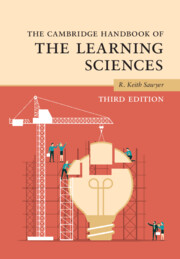Book contents
- The Cambridge Handbook of the Learning Sciences
- The Cambridge Handbook of the Learning Sciences
- Copyright page
- Contents
- Figures
- Tables
- Contributors
- Preface
- 1 An Introduction to the Learning Sciences
- Part I Foundations
- Part II Methodologies
- Part III Grounding Technology in the Learning Sciences
- Part IV Learning Together
- Part V Learning Disciplinary Knowledge
- 23 Research in Mathematics Education
- 24 Science Education and the Learning Sciences
- 25 Complex Systems and the Learning Sciences
- 26 Learning History
- 27 Learning to Be Literate
- 28 Arts Education and the Learning Sciences
- Part VI Moving Learning Sciences Research into the Classroom
- Index
- References
25 - Complex Systems and the Learning Sciences
Educational, Theoretical, and Methodological Implications
from Part V - Learning Disciplinary Knowledge
Published online by Cambridge University Press: 14 March 2022
- The Cambridge Handbook of the Learning Sciences
- The Cambridge Handbook of the Learning Sciences
- Copyright page
- Contents
- Figures
- Tables
- Contributors
- Preface
- 1 An Introduction to the Learning Sciences
- Part I Foundations
- Part II Methodologies
- Part III Grounding Technology in the Learning Sciences
- Part IV Learning Together
- Part V Learning Disciplinary Knowledge
- 23 Research in Mathematics Education
- 24 Science Education and the Learning Sciences
- 25 Complex Systems and the Learning Sciences
- 26 Learning History
- 27 Learning to Be Literate
- 28 Arts Education and the Learning Sciences
- Part VI Moving Learning Sciences Research into the Classroom
- Index
- References
Summary
A complex system is composed of many elements that interact with each other and their environment. The term emergence is used to describe how the large-scale features of the complex system arise from interactions between the components, and these system-level features are called emergent phenomena. This chapter reviews the multidisciplinary study of complex systems in physics, biology, and social sciences. This chapter reviews three topics: first, research on how people learn how to think about complex systems; second, how learning environments themselves can be analyzed as complex systems; and finally, how the analytic methods of complexity science – such as computer modeling – can be applied to the learning sciences. The chapter summarizes challenges and future opportunities for helping students learn about complex systems and for research in the learning sciences that considers educational systems to be complex phenomena.
Information
- Type
- Chapter
- Information
- The Cambridge Handbook of the Learning Sciences , pp. 504 - 522Publisher: Cambridge University PressPrint publication year: 2022
References
Accessibility standard: Unknown
Why this information is here
This section outlines the accessibility features of this content - including support for screen readers, full keyboard navigation and high-contrast display options. This may not be relevant for you.Accessibility Information
- 4
- Cited by
